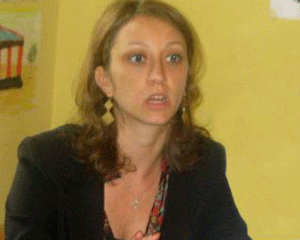Koba Bendeliani, Interpresnews
 The Interpresnews interviewed the Europe Coordinator of the Coalition for the International Criminal Court Luisa Mascia about the cooperation between the Government of Georgia and the International Criminal Court regarding the Russian-Georgian war of 2008.
The Interpresnews interviewed the Europe Coordinator of the Coalition for the International Criminal Court Luisa Mascia about the cooperation between the Government of Georgia and the International Criminal Court regarding the Russian-Georgian war of 2008.
-What is the preliminary analysis your organization is conducting, what are the materials and evidence analyzed?
I would like to clarify that I represent here an NGO, the Coalition for the ICC (CICC), which is a network of over 2000 civil society organizations promoting a fair, effective and independent ICC. The Court is instead an international judicial institution, which has jurisdiction over individuals responsible of committing war crimes, genocide and crimes against humanity.
The Court is currently conducting a preliminary analysis of the situation in Georgia following the war in August 2008. This means that the ICC is analyzing and processing material from different sources, as to determine whether there are sufficient grounds to open a investigation.
In this framework, the CICC visit to Tbilisi is mainly aimed at liaising with NGOs, the media, international and regional organizations, including the EU and the Council of Europe, as well as with local authorities, to discuss the ICC, as well as other accountability mechanisms to address the recent HR and IHL violations of August 2008. In particular, the CICC met with several representatives of NGOs and the media to raise awareness about the Court, its functions and mandate, as to ensure the public is adequately and accurately informed about the ICC.
-Is Georgian government cooperating with the court and what are the forms of this cooperation?
In official information released by the Court following an official visit of the Georgian Minister and Deputy Minister of Justice to The Hague, the ICC Prosecutor welcomed the on-going cooperation by the Georgian Government.
The CICC also welcomes this cooperation and encourages the Government of Georgia to provide any needed further support to the Court, in particular by facilitating the Prosecutor’s upcoming visit to Georgia, which is planned for June 2010.
-What is your assessment, how comprehensively has Georgian side investigated the case of alleged war crimes committed during the August war?
As long as investigations are ongoing, it will hard to make a thorough assessment. War crimes and crimes against humanity investigations are complex ones, which require specific expertise and knowledge, including when collecting evidence, interviewing witnesses or building the case.
While justice needs time, victims shall not be waiting too long. In that regard, it will be important to ensure that the victims and the communities most affected by the atrocities committed in August 2008 are kept informed about ongoing efforts to punish perpetrators of grave crimes. Justice shall be visible to victims and they should be able to submit their views at the earliest possible stage of the proceedings.
-Can the court start investigation about the Russia-Georgia war?
Yes. The Court has formally jurisdiction over war crimes and/or crimes against humanity allegedly committed on the territory of Georgia, and the fact that the Court has started a preliminary analysis into the post-war situation confirms that.
However, the Court will only formally act if States fail to try perpetrators; therefore, in its preliminary analysis, the Office of the Prosecutor is also monitoring ongoing national proceedings in Georgia.
-How realistic it is that the court starts investigation? If yes, who will apply to the court to start investigation, a state party, UN Security Council or the prosecutor?
It will depend on how much material the Prosecutor will have in his hands and on whether the alleged violations committed during the war will be considered grave enough by his office. There are 3 ways to trigger the Court’s jurisdiction in this case:
- Georgia is a State Party to the ICC since 2003. This means that the Government could take a proactive approach and be the one to ask the Prosecutor to initiate an investigation. So far, this was not done.
- The Prosecutor could use his power to open an investigation at his own initiative.
- The UNSC could adopt a resolution under Chapter VII of the UN Charter to refer the situation to the ICC. This is the unlikeliest scenario.
-Russia is not a state party to the statute, so can the court still proceed with the case?
It is right that Russia is not a State Party to the Statute, but the Court would have jurisdiction over crimes ordered and/or committed by Russians on the Georgian territory (as Georgia is instead a State Party). This is the principle of “territorial jurisdiction”.
If the Prosecutor decides to open an investigation, he will have the authority to look at alleged crimes committed by all sides to the conflict, including Russia.
News
December 13, 2023
Ethnic minorities outside the peace dialogue
November 6, 2023
‘Peace’ agenda of political parties
Popular
Articles
February 13, 2024



